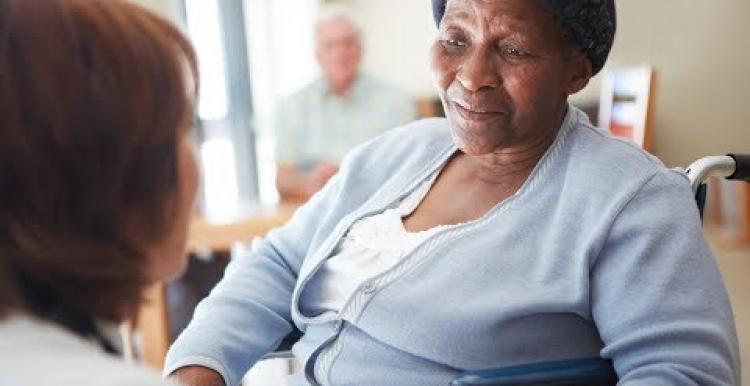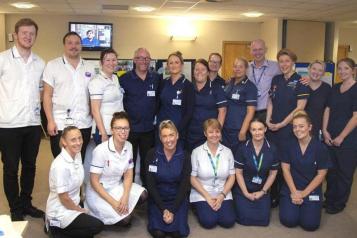What is Continuing Healthcare?

NHS continuing healthcare is the name given to a package of care which is arranged and funded solely by the NHS for individuals outside of hospital who have ongoing healthcare needs. You can receive continuing healthcare in any setting, including your own home or a care home. NHS continuing healthcare is free, unlike help from social services for which a financial charge may be made depending on your income and savings.
Am I eligible for NHS continuing healthcare?
NHS continuing healthcare is for adults. Children and young people may receive a "continuing care package" if they have needs arising from disability, accident or illness that cannot be met by existing universal or specialist services alone.
NHS Wigan Borough CCG must assess you for NHS continuing healthcare if it seems that you may need it.
For most people, there’s an initial checklist assessment, which is used to decide if you need a full assessment. However, if you need care urgently – for example, if you’re terminally ill – your assessment may be fast-tracked.
The initial checklist assessment can be completed by a nurse, doctor, other healthcare professional or social worker. You should be told that you’re being assessed, and be asked for your consent. The team will look at all your care needs and relate them to:
- what help you need
- how complex your needs are
- how intense your needs can be
- how unpredictable they are, including any risks to your health if the right care is not provided at the right time
Your eligibility for NHS continuing healthcare depends on your assessed needs, and not on any particular diagnosis or condition. If your needs change then your eligibility for NHS continuing healthcare may change.
You should be fully involved in the assessment process and kept informed, and have your views about your needs and support taken into account. Carers and family members should also be consulted where appropriate.
A decision about eligibility for a full assessment for NHS continuing healthcare should usually be made within 28 days of an initial assessment or request for a full assessment.
If you are not eligible for NHS continuing healthcare, you can be referred to your local council who can discuss with you whether you may be eligible for support from them.
If you still have some health needs then the NHS may pay for part of the package of support. This is sometimes known as a "joint package" of care.
Information and advice
The process involved in NHS continuing healthcare assessments can be complex. An organisation called Beacon gives free independent advice on NHS continuing healthcare.
Visit the Beacon website or call the free helpline on 0345 548 0300.
Assessment
Clinical commissioning groups, known as CCGs (the NHS organisations that commission local health services), must assess you for NHS continuing healthcare if it seems that you may need it.
For most people, there's an initial checklist assessment, which is used to decide if you need a full assessment. However, if you need care urgently – for example, if you're terminally ill – your assessment may be fast-tracked.
The initial checklist assessment can be completed by a nurse, doctor, other healthcare professional or social worker. You should be told that you're being assessed, and be asked for your consent.
Depending on the outcome of the checklist, you'll either be told that you do not meet the criteria for a full assessment of NHS continuing healthcare and are therefore not eligible, or you'll be referred for a full assessment of eligibility.
Being referred for a full assessment does not necessarily mean you'll be eligible for NHS continuing healthcare. The purpose of the checklist is to enable anyone who might be eligible to have the opportunity for a full assessment.
The professional(s) completing the checklist should record in writing the reasons for their decision, and sign and date it. You should be given a copy of the completed checklist.
Full assessments for NHS continuing healthcare are undertaken by a multidisciplinary team (MDT) made up of a minimum of 2 professionals from different healthcare professions. The MDT should usually include both health and social care professionals who are already involved in your care.
You should be informed who is co-ordinating the NHS continuing healthcare assessment.
The team's assessment will consider your needs under the following headings:
- breathing
- nutrition (food and drink)
- continence
- skin (including wounds and ulcers)
- mobility
- communication
- psychological and emotional needs
- cognition (understanding)
- behaviour
- drug therapies and medicine
- altered states of consciousness
- other significant care needs
These needs are given a weighting marked "priority", "severe", "high", "moderate", "low" or "no needs".
If you have at least 1 priority need, or severe needs in at least 2 areas, you can usually expect to be eligible for NHS continuing healthcare.
You may also be eligible if you have a severe need in 1 area plus a number of other needs, or a number of high or moderate needs, depending on their nature, intensity, complexity or unpredictability.
In all cases, the overall need, and interactions between needs, will be taken into account, together with evidence from risk assessments, in deciding whether NHS continuing healthcare should be provided.
The assessment should take into account your views and the views of any carers you have. You should be given a copy of the decision documents, along with clear reasons for the decision.
Further information
If you're looking for more advice on accessing continuing healthcare within the Wigan Borough, please visit the Healthier Wigan website:


